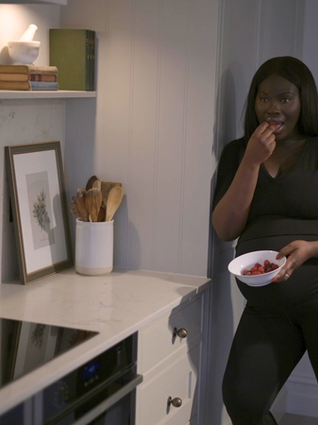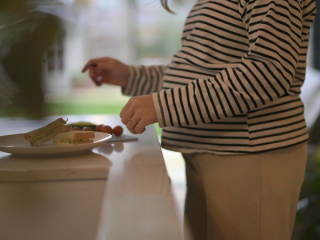
- Home
- Advice Hub
- Pregnancy
- Pregnancy Diet
- Benefits Of Eating Fruits During Pregnancy
Benefits of Eating Fruits During Pregnancy
Find out more about which fruits to eat during pregnancy and what the benefits are for you and your baby.
Fruit is an important part of a balanced diet, providing you with plenty of minerals, vitamins and fibre to keep your digestive system happy. Though the benefits of eating fruit during pregnancy are no different than at any other time in your life, you might appreciate them more when your digestive system is more sensitive than usual and your body requires even more emphasis on good nutrition.
Thankfully, you don’t need to buy a lot of expensive super foods to get all the benefits of fruits during pregnancy. Your standard fruit bowl provides some of the essential vitamins and minerals necessary for optimal foetal development. Plus, they’re delicious and good for mum, too!
How much fruit should I be eating a day when pregnant?
The general rule of thumb is to try to eat at least five portions of fruit and veg every day. It might sound like a lot at first, but smashed avocado with a glass of juice or a bowl of porridge with chopped strawberries and banana sees you over a third of the way there before lunchtime! Aim for a good balance of fruit and vegetables; varying the colours helps to get a wide range of vitamins and minerals into your pregnancy diet.
It doesn’t all have to be fresh fruit. Tinned and frozen fruits and vegetables can also form part of a fantastic nutrient-packed snack and are ideal for tackling sugar cravings in between meals. For example, serving a snack of low fat yoghurt alongside canned pineapple rings in their natural juice or frozen blueberries are just as good as, say, a fresh orange, for contributing to your fruit and vegetable intake during pregnancy. Plus, they will last for ages in your kitchen cupboard or freezer, so you don’t need to stress about using them up right away.
Mix it up for extra deliciousness – an apple with peanut butter, or chopping some cooked beetroot into a humous dip both make a delicious snack.
Be wary of including dried fruits in snacks, as they are relatively high in sugar and are therefore best eaten just after mealtimes rather than as a snack.
How much is a portion of fruit or veg?
A portion of fruit is roughly 80g of anything fresh, frozen or canned. Dried fruit portions are smaller, at 30g, and for juices you should aim for 150 ml. That’s because juices and smoothies don’t usually contain the skin and the pulp of the fruit, which leads to a more concentrated source of sugar and reduces the number of nutrients contained in the overall juice. As such, juice can only be counted once towards your daily fruit and veg target and should ideally be consumed with food (as this helps to reduce the risk of tooth decay).
To save you weighing and measuring every portion of fruit before you eat it, here’s some examples of fruit portion sizes.
Fruit portion examples
One portion of fruit is the equivalent of:
- One slice of melon
- One apple, pear, small banana, nectarine, or peach
- Two slices of mango
- Two plums, satsumas, or kiwi fruits
- Half a grapefruit
- Two heaped tablespoons of frozen berries
- Eight strawberries
- Twelve grapes
- Fourteen cherries
- Two tinned pineapple rings, in fruit juice rather than syrup
- 150ml glass of fruit juice or smoothie
- 30g dried fruit. This could be two dried figs, three dried prunes or apricots, or one tablespoon raisins, sultanas, or mixed fruit
Common fruits and their benefits during pregnancy
Eating a rainbow of colourful fruit and vegetables will help ensure the consumption of a variety of vitamins, minerals and fibre.
Although all fruits provide important nutrients, there are some which you may see being called ‘superfoods’.
‘Superfoods’ is a term which has no legal definition, and therefore can be a little misleading, and not necessarily worth the additional price tag.
However, berries such as blueberries, blackberries and strawberries, relative to their size, are a concentrated source of certain nutrients, so be sure to add these to the variety of fruit and vegetables you consume.
Dragon fruit is a good source of fibre, useful for keeping your digestive system moving. It also contains vitamin C, calcium and magnesium – all of which are beneficial nutrients during pregnancy.
Did you know that kiwifruit is a type of berry? It’s full of vitamin C and fibre, as well as antioxidants, and is thought to be good for heart health as well as digestive health.
Guava has more vitamin C than an orange – making it a great immunity booster. Like other fruits, it also contains dietary fibre.
Passion fruit also contains vitamin C and fibre but stands out for its vitamin A (retinol) content, which supports healthy eyes and cells. Though vitamin A supplements are not recommended during pregnancy, you still need to get your vitamin A content from food, so don’t feel you have to avoid passion fruit – it’s good for you!
Pears are high in vitamins C and K, potassium and magnesium, as well as being a good source of fibre. Potassium and magnesium both help nerves and muscles function normally, not forgetting the importance of vitamin C to the immune system.
Bananas also contain potassium, with one medium banana providing about 17% of a woman’s daily potassium needs. They’re very easy to digest, so if your stomach is feeling sensitive a banana is a good go-to food.
What fruits to avoid during pregnancy
There aren’t any fruits that need to be routinely avoided in pregnancy, unless for example you have an allergy, or you are advised to do so by your Healthcare professional. For example, if you are diagnosed with gestational diabetes, you may be advised to alter your fruit eating pattern and cut down on your intake of dried fruit.
Always remember to ensure good hygiene practices when preparing any food. Simple things like washing fruit to remove any traces of soil before you tuck in and keeping work surfaces and hands clean etc can help avoid getting any nasty germs in your system.
Enjoy finding new ways to incorporate fruit into your pregnancy diet!






